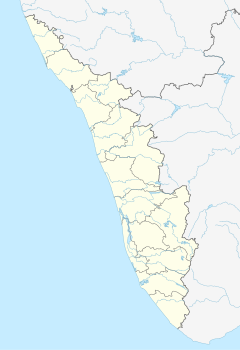
Guruvayur Temple is a Hindu temple dedicated to Guruvayurappan, located in the town of Guruvayur in Kerala, India. Administrated by the Guruvayur Devaswom, it is one of the most important places of worship for Hindus in Kerala and Tamil Nadu and is often referred to as Bhuloka Vaikunta. The temple is Classified one among the 108 Abhimana Kshethram of Vaishnavate tradition.

The Vadakkumnathan Temple is an ancient Hindu temple dedicated to Shiva in Thrissur, in the Thrissur district of Kerala, India. The temple is a classical example of the architectural style of Kerala and has one monumental tower on each of the four sides in addition to a koothambalam. Mural paintings depicting various scenes from the Mahabharata can be seen inside the temple. The shrines and the Kuttambalam display vignettes carved in wood. The temple, along with the mural paintings, has been declared as a National Monument by India under the AMASR Act. According to popular local lore, this is the first temple built by Parashurama, the sixth avatar of Vishnu. Thekkinkadu Maidan, encircling the Vadakkumnathan Temple, is the main venue of the renowned Thrissur Pooram festival.
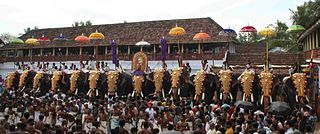
Sree Poornathrayesa temple is a Hindu temple situated in Tripunithura, Kochi, the capital of the former Kingdom of Cochin, Kerala, India. The temple is considered among the greatest temples in Kerala and was the first among eight royal temples of the erstwhile Kingdom of Cochin. The presiding deity is Vishnu as Santhanagopala Murthy or Poornathrayeesa. He was the national deity of Cochin and protector guardian of Tripunithura. Poornathrayeesa is known for his love of elephants. Hence more than 40 elephants participate in his Vrishchikotsavam.

Cherpu is a suburb of Thrissur city in the Kerala State of South India. It is 12 kilometres south of Thrissur town and is on the Thriprayar road. It is dotted by a number of temples and has quite a few rivers flowing by its vicinity.

Barkur is an area in the Brahmavara taluk, Udupi district of Karnataka state in India, comprising three villages, Hosala, Hanehalli, and Kachoor. The area is located on the bank of River Seetha. It is also referred to as a "temple town".
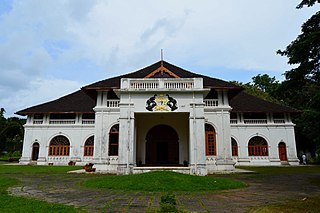
Shakthan Thampuran Palace is situated in City of Thrissur in Kerala state, India. It is named as Vadakkekara Palace, was reconstructed in Kerala-Dutch style in 1795 by Ramavarma Thampuran of the erstwhile Princely State of Cochin, well as Sakthan Thampuran is preserved by Archaeological Department. The palace was converted into a museum in 2005 by State.

Tirunavaya Temple is an ancient Hindu temple at Tirunavaya, central Kerala, India, on the northern bank of the Bharatappuzha, dedicated to Navamukundan (Narayana-Vishnu).

The Aranmula Parthasarathy Temple is a Hindu temple located near Aranmula, a village in Pathanamthitta District, Kerala, South India. It is dedicated to the Lord Krishna, an avatar of Vishnu, who is worshipped as Parthasarathy. Constructed in the Kerala style of architecture, it is one of the "Divya Desams", the 108 temples of Vishnu revered by the Alvar saints.
A Goan temple is known as a dēvūḷ (देवूळ) or sansthān (संस्थान) in the Konkani language. These temples were once the centres of villages, cities, and all the other social, cultural and economic gatherings in Goa. These were known as grāmasansthās (ग्रामसंस्था) in Konkani.

Ettumanoor Mahadeva temple is an ancient Shiva temple in Kottayam, Kerala, India. The temple is one of the major Shiva temples in Kerala, along with Vaikom Temple, Kaduthruthy Mahadeva Temple, Chengannur Mahadeva Temple, Vazhappally Maha Siva Temple, Ernakulam Shiva Temple, Vadakkunathan temple and Sreekanteswaram Mahadeva Temple, Thiruvananthapuram.

Kerala architecture is a style of architecture found in the Indian state of Kerala, and in parts of the Tulu Nadu region of Karnataka. Kerala's architectural style includes a unique Hindu temple architecture that emerged in southwestern India, and varies slightly from the Dravidian architecture observed in other parts of southern India. The architecture of Kerala is derived from the Indian Vedic architectural tradition and forms a part of Dravidian architecture, one of the three styles of temple mentioned in the ancient books on Vastu Shastra. The Tantrasamuchaya, Thachu-Shastra, Manushyalaya Chandrika, and Silparatna are all architectural treatises that have had an impact on the architecture of Kerala. The Manushyalaya Chandrika, a work devoted to domestic architecture, has its roots in Kerala.
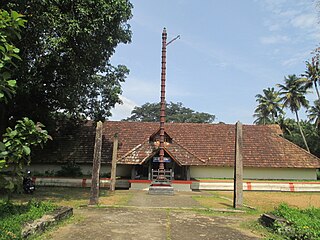
The Thrichittatt Mahavishnu Temple is a Hindu temple dedicated to Vishnu,located in Chengannur, Alappuzha District, Kerala, South India. Constructed in the Kerala style of architecture, the temple is glorified in the Nalayira Divya Prabandham, by Nammalvar, one of the Sri Vaishnava saint-poets of the 8th century called the Alvars. It is one of the 108 Divya Desams dedicated to Krishna, an avatar of Vishnu, who is worshipped as Imayavarappan. The nearest railway station to the temple is located in Chengannur, while the nearest airports are Trivandrum International Airport and Nedupumpassery Airport Ernakulam.
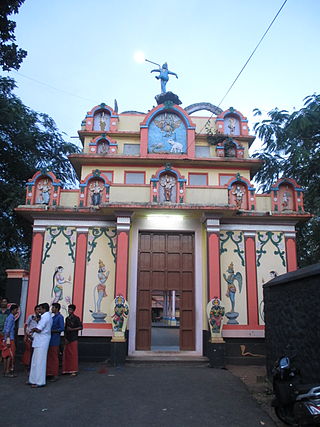
The Thiruvanvandoor Mahavishnu Temple is a Hindu temple dedicated to Vishnu and located in Thiruvanvandoor, Alappuzha District, Kerala, South India. Constructed in the Kerala style of architecture, the temple is glorified in the Nalayira Divya Prabandham, the early medieval Tamil canon of the Alvar saints from the 6th–9th centuries CE. It is one of the 108 Divya Desams dedicated to Vishnu, who is worshipped as Paambanaiappan. The nearest railway station to the temple is located in Chengannur, while the nearest airport is Trivandrum International Airport.
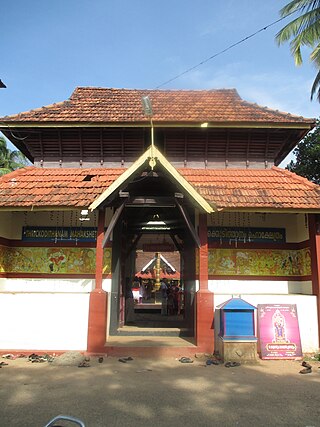
Thrikodithanam Mahavishnu Temple is a Hindu temple dedicated to Vishnu and located in Thrikkodithanam, Kottayam District, Kerala, South India. Constructed in the Kerala style of architecture, the temple is glorified in the Nalayira Divya Prabandham, the early medieval Tamil canon of the Alvar saints from the 6th–9th centuries CE. It is one of the 108 Divya Desam dedicated to Krishna, an avatar of Vishnu, who is worshipped as Mahavishnu. The nearest railway station to the temple is located in Changanassery, while the nearest airport is Cochin International Airport.
Thirupalkadal Sreekrishna Temple is one of the oldest Hindu temples dedicated to the Hindu God Vishnu, located in the village Keezhperoor, Chirayinkeezhu Taluk, Thiruvananthapuram in Kerala, India. The central icon is a four-armed standing Vishnu carrying the conch Panchajanya, the discus Sudarshana Chakra, the mace Kaumodaki and a lotus with a holy basil garland. The principal deity, Krishna was the family deity of Ay dynasty. It is believed that Kulashekhara Alvar, considered the seventh in the line of the twelve Alvars, renovated this temple. While it is not mentioned in the 108 Divya Desams, it does find mentioned in the list of Abhimana Kshethrams, as well as in many texts and legends. The history of this temple is closely intertwined with the Cheras' and Cholas' Empires and the Kingdoms of Venad and Travancore.

Chengannur Mahadeva Temple is a prominent Hindu temple, dedicated to Shiva and located in the town of Chengannur in the South Indian state of Kerala. The temple is one of the major Shiva temples in Kerala, along with the Ettumanoor Mahadevar Temple, Kaduthruthy Mahadeva Temple, Vaikom Temple, Ernakulam Shiva Temple and Vadakkunnathan Temple. There are shrines for Ganesha, Dakshinamurti, Subrahmanya, Shasta, Krishna, Nilagriva, Sthalisha, Hanuman, Ganga, and serpent deities inside and outside the temple complex.
Poonjar dynasty was one of the royal dynasties in medieval Kerala descended from the Pandya kings of Madurai. History has it that Manavikrama Kulasekara Perumal, a Pandya king as the sole founder of the dynasty. It was a minor principality in the central Travancore region which covered the parts of present-day Dindigul, Cumbum, Kudallor, Bodinayakkanur, Vandiperiyar, Peerumedu and Kannan Devan hills.

The Aryankavu Sastha Temple is a Hindu temple located in Aryankavu in the Kollam district of the Indian state of Kerala. It is one of the five major temples dedicated to Shasta in Kerala, the others being Kulathupuzha, Achankovil, Sabarimala and Kanthamala. The temple's idol is believed to have been consecrated by Parashurama. The temple is governed by the Travancore Devaswom Board.
Pandavam is a village in Aymanam panchayath in Kottayam District in the Indian state of Kerala. It is located near Kudayampady on Kottayam - Olassa - Parippu route.

Chowalloor Siva Temple is an ancient Hindu temple dedicated to Shiva at Guruvayoor of Thrissur District in Kerala state in India. The presiding deity of the temple is Shiva, located in main sanctum sanatorium, facing West. According to folklore, sage Parashurama has installed the idol. The temple is a part of the 108 famous Shiva temples in Kerala and one among the five Shiva temples around Guruvayoor. Only Hindus are allowed inside the temple premises. Daily three poojas are conducted for Lord Shiva; Shivaratri and Ashtami Rohini are the major festivals of the temple.


